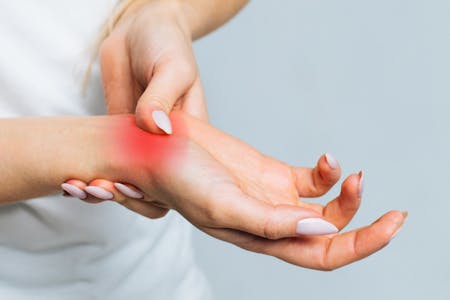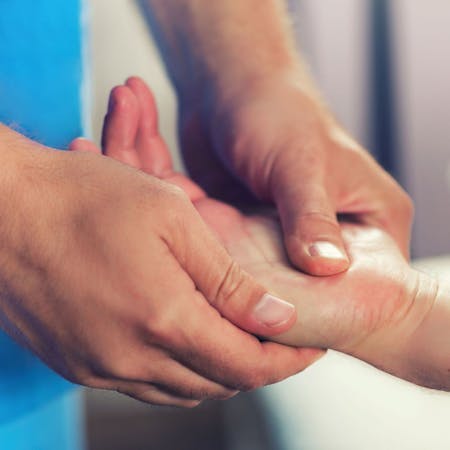-
The elbow is a joint formed by three bones that come together:
- Upper arm bone (humerus)
- Thinner and longer of the two bones in the forearm (ulna)
- Shorter and thicker bone in the forearm (radius)
What causes elbow pain?
Elbow pain is typically caused by overuse and sports injuries. The following are some conditions that can cause elbow pain:
- Medial Epicondylitis (Golfer's Elbow) - tendinopathy of the inner tendons in the elbow commonly caused by repetitive movements resulting from work or household chores, a baseball pitcher's repetitive throwing motion and golfer's downward swing of a golf club./li>
- Lateral Epicondylitis (Tennis Elbow) - tendinopathy of the tendons on the outside of the elbow commonly caused by repetitive movements resulting from household chores, racquet sports and certain occupations.
- Olecranon Bursitis (Student's Elbow, Miner's Elbow, Draftsman's Elbow) - inflammation of the small sacs of fluid (bursae) that help protect the pointed elbow bone typically caused by trauma (e.g., falling on the elbow or hitting it on a hard surface).
- Osteoarthritis (OA) - damage and deterioration of the cartilage (connective tissue in the joints) typically age-related but can also be due to a previous injury (e.g., elbow fracture).
- Elbow Strain - over-stretched or torn forearm flexor or extensor muscles typically caused by trauma or overuse.
- Elbow Sprain - over-stretched or torn ligaments (band of tissue that connects bone to bone) that can result from trauma or overuse.
- Elbow Dislocation - a bone moves from its usual position commonly caused by catching yourself during a fall or when you swing a toddler by the forearms (nursemaid's elbow).
- Elbow Fracture - when a bone cracks or breaks typically resulting from a sudden blow (e.g., an auto accident or contact sports injury).
- Osteochondritis Dissecans (Panner's Disease) - small pieces of cartilage and bone become dislodged in the elbow joint typically resulting from a sports injury.
When to See a Doctor for Elbow Pain
Elbow pain is typically short-term and no cause for concern. These can usually be treated rest, ice therapy, medication and physical therapy. However, if you are experiencing these symptoms, it would be a good idea to consult with an orthopedic doctor.
- Your elbow doesn't improve after treating with rest and ice therapy.
- Your elbow is painful even when you aren't using your arm.
- Pain, redness or swelling continues to get worse instead of better.
- You are not able to move your elbow or arm normally.
- Normal, everyday activities are painful or becoming more difficult to do.
Fractures and dislocations are serious conditions requiring immediate medical attention. See a doctor right away if:
- Your elbow is intensely painful and has bruising and swelling around the joint.
- You notice an obvious deformity in your elbow.
- You are unable to move your able.
- Your elbow starts hurting following an injury or fall.
-
The wrist is also called the carpus. It is a complex joint between five metacarpal bones of the hand and the wrist (radiocarpal), which is joint between the radius (shorter of the two forearm bones on the thumb side of the arm) and ulna (longer of the forearm bones on the thumb side of the arm) bones of the forearm.
What causes wrist pain?
Wrist pain can be caused by sprins or fractures from a fall or other sudden injury. It can also be caused by chronic issues, such as repetitive stress, arthritis and carpal tunnel syndrome. Ulnar wrist pain and Radial wrist pain are usually caused by a scapholunate ligament sprain, partial tear or complete tear typically resulting from a fall onto an outstretched hand (FOOSH).
Other common causes of wrist pain include:
- Tumors including Glomus Tumor, Ganglion Cyst, Osteochondroma
- Carpal Instability
- Distal Radius Fracture (a fracture at the end of the radius bone near the wrist joint)
- Carpal Tunnel Syndrome
Chronic regional pain syndrome (CRPS)
Physical Therapy for Wrist Pain
You may be referred to physical therapy for conservative care of acute or chronic symptoms. People are also referred before surgery for pre-operative (pre-surgical) therapy and/or post-operative (post-surgical) therapy to help with recovery and return of function.
If you are referred for therapy, remember that you can choose where you get your care even if the referring physician refers you to another therapy practice. Choose us for your wrist therapy needs.
-
The hand is a complex prehensile, appendage with opposable thumbs, five distinct fingers (digits, phalanges) with fingernails, around 19 major and minor bones, a broad palm (metacarpus) and back (opishenar). Fully functional hands can accomplish amazing things. But, an injury or chronic condition can be debilitating.
What is hand pain?
Hand pain is any discomfort that occurs between your wrist and fingertips. The pain in your hand may be sharp, dull, tingly, or throbbing and it may be accompanied by the onset of redness, stiffness, or swelling.
What causes hand pain?
Hand pain can originate in the bones, joints, connective tissues, tendons and nerves. It can be caused by inflammation, nerve damage, repetitive motion injuries, sprains and fractures or a long-term chronic condition.
Common causes of hand pain include:
- De Quervain's Tendinitis - inflammation of the tendons at the base of the thumb. It's also known as Mommy Thumb because new mothers get it from holding their babies in awkward positions. Wrist fractures also raise your risk for de Quervain's.
- Fracture - categorized as simple, complex, comminuted and compound.
- Arthritis - the leading source of hand pain. There are many forms of arthritis, but the most common ones are Rheumatoid Arthritis (RA) and Osteoarthritis (OA)
- Tendon Injury and Laceration
- Trigger finger - most common in adults between ages 40 and 60.
- Carpal Tunnel Syndrome
- Tumors including Glomus Tumor, Digital Mucous Cyst and Enchondroma
- Jersey Finger
- Mallet Finger (also known as Baseball Finger)
- Bennett Fracture-Dislocation
- Friction Blisters
- Stroke/Cerebral Vascular Accident (CVA)
- Parkinson's Disease
Physical Therapy for Hand Pain
You may be referred to physical therapy for conservative care of acute or chronic symptoms. People are also referred before surgery for pre-operative (pre-surgical) therapy and/or post-operative (post-surgical) therapy to help with recovery and return of function.
If you are referred for therapy, remember that you can choose where you get your care even if the referring physician refers you to another therapy practice. Choose us for your hand therapy needs.
-
Coronavirus Update
COVID-19 and Your Safety
- Our office is open and accepting appointments to provide essential care to patients. Our clinic is in complete compliance with current CDC protocols.
- We are screening all patients for possible exposure to COVID-19.
- Special attention and precautions are given to those over age 65 and those with other conditions that may put them at higher risk.
- Our staff and patients are wearing masks, gloves when appropriate and washing hands frequently.
- Commonly accessed areas are cleaned and sanitized frequently.
- Free phone consultations are available to all patients and those individuals who may call in with questions.
- Please let us know how we may be of service to you.
- Request A Free Consultation



